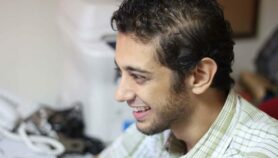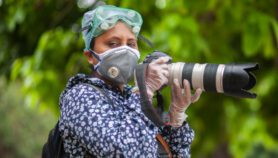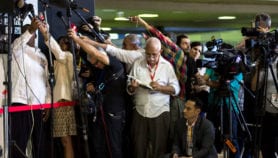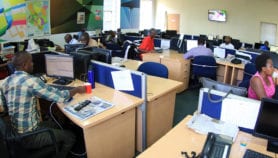Send to a friend
The details you provide on this page will not be used to send unsolicited email, and will not be sold to a 3rd party. See privacy policy.
The conference is fantastic so far. Participants from across the globe have gathered together in Finland's majestic capital and largest city, Helsinki, in the southern part of the country.
It is a magical time of year in Finland: midsummer, when the nights are much shorter than the days. We have 19 hours of daylight, with darkness setting in around midnight.
Soothing folk music and dancing by the Katrilli Finnish Folk Dancers left attendees in a state of bliss on Monday afternoon, following a day of pre-conference workshops and discussions in the halls and auditoriums of the Porthania University, the venue for the meeting.
“Scientists can over-hype advances, it is just human nature.”
Paul Kemp
Overall, the conference has lined up programmes that whet every participant's appetite — whether journalists, researchers, academics or press officers, everyone has a session to sink their teeth into.
An interesting session I attended focused on the downside to advances in new technologies such as biotechnology, regenerative medicine and gene therapy.
Such advances have great potential to aid developing countries.
But the challenge that accompanies them is how to ensure that the public are sufficiently well-informed to make knowledgeable decisions on their own without the influence of forces from media, industry or academia.
The session also asked whether advances in new technologies are over-hyped.
"Scientists can over-hype advances, it is just human nature," said panellist Paul Kemp, chief executive officer of Intercytex, a biopharmaceutical company based in the UK.
The reason for this, he claimed, is deliberate "showbiz" exaggerations by scientists who want to show off to their peers.
He added that this kind of practice is common among scientists who want to attract more funding.
But whose responsibility is it to engage and inform the public regarding advances in new technologies?
Panellist Clive Cookson, science editor of the Financial Times, believes that the task lies with science journalists, but warned them against buying into exaggerated claims about both the benefits and harmful aspects of such technologies. "The media needs to be proactive rather than reactive," he said.
Science journalists, he said, should work to to dispel the myths — both positive and negative — that accompany new technologies by consulting carefully with experts, in order to ensure the public are able to make well-informed decisions.
George Achia
Science journalism to export: a matter of context
Attending an international conference is always a great opportunity to find out more about how colleagues from all over the world do their job. The skills, tools and focus can vary widely, depending on the social and political context, infrastructure, educational opportunities, and economic circumstances that science journalists face.
These differences were discussed yesterday during the session 'Around The Globe', which was moderated by SciDev.Net's Latin America and Caribbean coordinator Luisa Massarani.
Massarani gave an overview of the Global Science Journalism Report — conducted by SciDev.Net, the London School of Economics and the Museum of Life, in Brazil — which profiles science journalists around the world: who they are, where they live, their training background and what circumstances they work in.
Panellist Angela Posada-Swafford, a Colombian journalist currently residing in the United States, shared her experience as a freelance science writer for some of the biggest magazines in Latin America, Spain and the US.
"I receive many calls from colleagues who want to work as freelancers, but their ideas keep being rejected by the publications," she said. "If that has happened to you, you need to ask yourself: 'Do I know the publication I want to write for? Do I know its audience?' Very often, the answer is no. We don't get the jobs because sometimes we want to collaborate with media in a different country and don't know its context, and some other times because there is a lack of training on writing science."
“The idea of writing about science starts with curiosity and passion. For me, that's all you need”
Shiow Chin Tan
Her comments sparked a heated debate about the necessity of formal training in science communication for journalists.
Shiow Chin Tan, a journalist from The Star in Malaysia, said: "I think training is overrated. In countries like mine, where those options are not available, the idea of writing about science starts with curiosity and passion. For me, that's all you need".
But Bernard Appiah, a science journalist from Ghana who is currently based in the US, said that training is necessary.
Another journalist, from Jordan, said that the best thing is to have a balance. "You need to be passionate about science, but training is also important because we can't forget we have a responsibility [to] our societies. In my region, if you don't write about politics you're invisible. But science can always find its way. Right now a good topic to discuss is the use of chemical weapons in Syria. Without proper training, you can cause chaos," she said.
From this session, I learned that when it comes to writing about science in a globalised world, context is everything. Connecting with your colleagues from other latitudes gives you the chance to understand your own situation better, and establishing networks helps to increase the visibility of what is being done in your region.
It seems there's a lot going in science communication in the developing world.
Andrea Small Carmona
Can we still trust science?
There is no evidence that scientific misconduct is increasing — despite media and academic speculation to the contrary in light of the recent hike in science articles being retracted from the academic journals, WCSJ 2013 heard yesterday.
Science is largely publicly funded and provides evidence for things that affect us — such as healthcare — so we have a stake in whether we can still trust science, said panellists at the 'Can we still trust science?' session.
The new data presented at the conference examined correction notices and retractions in a large number of journals over the past 20 years or so, and have been submitted for publication in PLOS Medicine.
They reveal a consistent lack of evidence that the recent, highly publicised concerns about more and more retractions also signal a rise in scientific misconduct — assumed to stem from researchers chasing their careers in a 'publish or perish' culture. Instead, the rise in retractions seems mainly driven by more journals retracting articles.
However, panellists said that retractions that are based on misconduct — tracked most notably by the Retraction Watch blog — are a good source of news for science journalists. They are discreet events, and proven instances of irregularities — including plagiarism or other types of misconduct — that provide a springboard for investigating why the misconduct took place, what universities or journals are doing to contain it and how open they are in dealing with it.
The public interest in such issues should drive the stories, the panellists said, but, so far, the main conclusion is that we can still trust science on the whole — at least until there is more evidence to the contrary.
See the slideshow from the event below:
Mićo Tatalović, news editor














